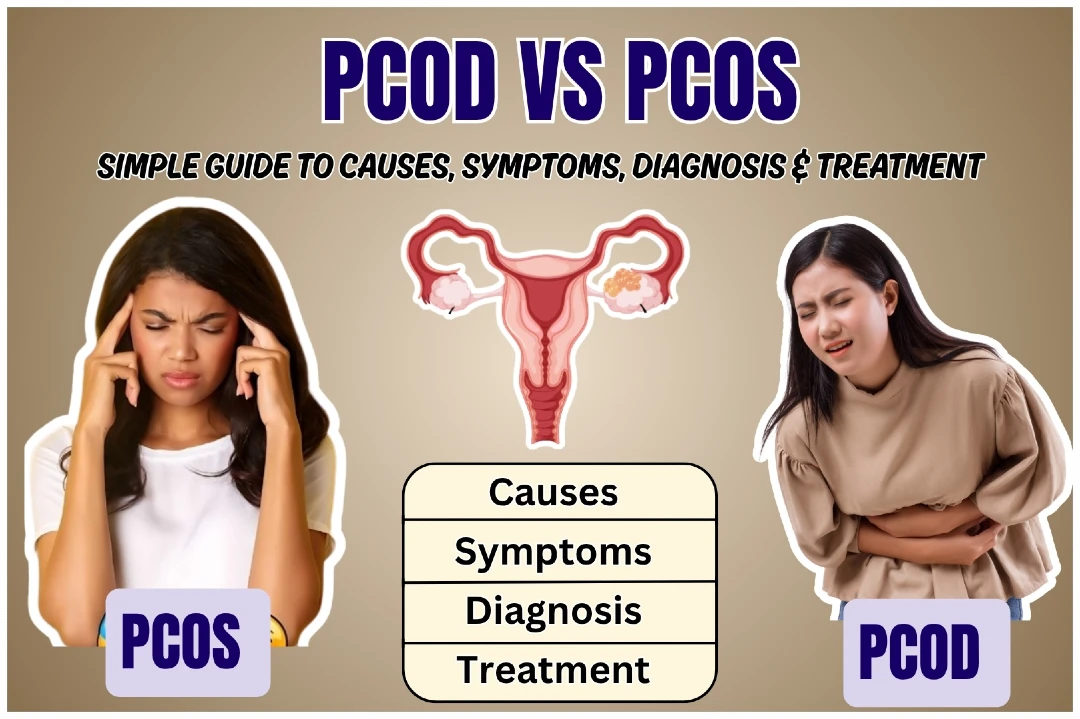PCOS vs PCOD: Simple Guide to Causes, Symptoms, Diagnosis & Treatment

PCOS vs PCOD: Simple Guide to Causes, Symptoms, Diagnosis & Treatment
Many women experience irregular periods, acne, or unwanted hair growth, but they often don’t know whether it is PCOD or PCOS. PCOD (Polycystic Ovarian Disease) and PCOS (Polycystic Ovary Syndrome) may sound similar and both conditions are related to ovarian health and hormones, they are not the same. Understanding the difference is important for managing symptoms and preventing long-term health problems.
Before we dive in, here’s some good news: your hormonal imbalance and its symptoms, including acne and irregular periods, can be managed naturally with Unicare’s Nari Urja, an Ayurvedic supplement.
Let’s explore PCOD and PCOS—their causes, symptoms, differences, diagnosis, and treatment simply.
Difference Between PCOD and PCOS
What is PCOD?
PCOD stands for Polycystic Ovarian Disease. It happens when your ovaries develop many immature eggs (cysts) that don’t release regularly. This can cause:
- Irregular periods
- Weight gain
- Acne or oily skin
- Hair growth on face or body
What is PCOS?
PCOS, or Polycystic Ovary Syndrome, is more serious than PCOD. It is a hormonal and metabolic disorder. This means your body produces higher levels of male hormones (androgens) and may develop insulin resistance, making it harder to manage weight or sugar levels.
PCOS can cause:
- Irregular or missed periods
- Acne or skin issues
- Unwanted hair growth
- Weight gain, especially around the belly
- Fertility problems
Unlike PCOD, PCOS affects overall health, including metabolism, so early diagnosis and treatment are important.
Here’s a simple comparison PCOD vs PCOS:
| Feature | PCOD | PCOS |
| Severity | Mild, mostly ovary-related | More serious, affects hormones and metabolism |
| Ovulation | Can ovulate occasionally | Often no ovulation or very irregular |
| Long-term risk | Lower if managed | Higher risk of diabetes, heart disease, infertility |
| Symptoms | Irregular periods, acne, hair growth | Irregular periods, acne, hair growth, weight gain, insulin resistance |
| Treatment | Lifestyle + supplements like Nari Urja | Lifestyle + medications + supplements like Nari Urja |
Causes of PCOD and PCOS
Both PCOD and PCOS are linked to hormonal imbalances, but PCOS has a stronger metabolic component. Common causes include:
- Hormonal imbalance – Excess male hormones can prevent regular ovulation.
- Insulin resistance – Body struggles to use insulin, leading to higher male hormones.
- Genetics – Family history increases risk.
- Lifestyle factors – Poor diet, lack of exercise, stress.
- Inflammation – Low-level inflammation in the body can worsen symptoms.
Common Symptoms
PCOS / PCOD Symptoms
- Irregular periods – cycles may be too long, too short, or missed
- Acne – stubborn acne that doesn’t respond to regular treatments (pcos acne)
- Unwanted hair growth – face, chest, back
- Hair thinning – hair loss on scalp
- Weight gain – especially around waist
- Dark patches on skin – under arms, neck, or thighs
- Fertility issues – difficulty conceiving
Tip: If you notice several of these symptoms together, it’s important to consult a doctor.
PCOD or PCOS: Which is More Dangerous?
- PCOS is more dangerous because it affects metabolism, insulin levels, and long-term health.
- PCOD can be managed well with lifestyle changes and supplements like Nari Urja, reducing risks of weight gain, acne, and irregular cycles.
- Both can affect mental health, self-confidence, and fertility, so early action is important.
Diagnosis: How to Check for PCOD / PCOS
Doctors use a combination of symptoms, blood tests, and ultrasounds to diagnose.
1. Medical History & Physical Exam
- Discuss menstrual cycle patterns
- Look for acne, hair growth, and weight changes
- Review family history and lifestyle factors
2. PCOS Blood Test / Hormonal Test
A PCOS blood test measures:
- Testosterone and other male hormones
- LH (Luteinizing Hormone) and FSH (Follicle Stimulating Hormone)
- Insulin and blood sugar levels
- Lipid profile (cholesterol, triglycerides)
These tests help confirm hormone imbalance and insulin resistance.
3. Ultrasound
- Checks ovaries for multiple small cysts
- Measures ovarian size and number of follicles
4. Other Tests
- Thyroid or prolactin tests to rule out other causes
- Pregnancy test if needed
Treatment Options
Treatment depends on symptoms and goals. It usually combines lifestyle changes, medical treatment, and natural support.
Lifestyle Changes
- Healthy diet with low sugar, high fiber
- Regular exercise: cardio + strength training
- Stress management and good sleep
Medical Treatment
- Birth control pills to regulate cycles
- Anti-androgen medications to reduce acne and hair growth
- Metformin for insulin resistance
- Fertility treatments if pregnancy is a goal
Natural & Ayurvedic Support
- Nari Urja helps balance hormones, reduce acne, and support regular periods
- Yoga and stress management can improve insulin sensitivity and overall health
PCOS Acne: How to Manage
Acne caused by PCOS or PCOD happens due to excess male hormones. Tips to manage:
- Use gentle skincare, avoid harsh chemicals
- Maintain a healthy diet, reduce sugar
- Take supplements like Nari Urja for hormonal support
- Follow medical advice for anti-androgen medications if needed
Prevention & Self-Care
Even if you have PCOD or PCOS, you can reduce symptoms and prevent complications:
- Regular exercise to improve insulin sensitivity
- Balanced diet with low glycemic index foods
- Avoid stress and get enough sleep
- Monitor your menstrual cycle and health regularly
Consider natural support like Nari Urja for hormonal balance
Conclusion
PCOD vs PCOS can seem confusing, but understanding the differences helps you manage your health better. While PCOS is more serious, both conditions can benefit from early diagnosis, lifestyle changes, medical care, and natural support.
Supplements like Nari Urja can be a gentle, Ayurvedic way to support hormone balance, reduce acne, and regulate cycles. Combined with proper medical care and healthy habits, most women can lead a healthy, active life and manage symptoms effectively.
Remember: Don’t ignore irregular periods, stubborn acne, or unexplained weight gain. Early action makes a big difference.
Related Products
Nari Urja pack of 3: Ayurvedic Syrup for Hormonal Imbalance & Irregular Period
Frequently Asked Questions
PCOD affects ovaries with cysts and occasional ovulation. PCOS is a hormonal and metabolic disorder with more severe risks.
Through medical history, physical exam, PCOS blood test, and ultrasound.
Yes, excess male hormones can cause PCOS acne, especially on face, chest, and back.
Yes, with lifestyle changes, yoga, diet, and Ayurvedic supplements like Nari Urja, along with medical guidance.
It measures hormones like testosterone, LH, FSH, insulin, and glucose to check for hormonal imbalance and insulin resistance.












